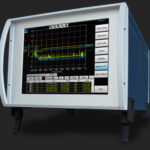TDEMI stands for a novel generation of EMI measurement systems providing real-time analysis and enabling the user to perform high-quality emission measurements in a fractional amount of time compared to conventional EMI receiver technology. Ultra-fast Analog-to-Digital Conversion as well as real-time signal processing allows to emulate the behavior of instruments like oscilloscopes, receivers and spectrum analyzers. Due to the TDEMI’s powerful signal processing hardware platform, corresponding to a computation power of between 20-30 conventional. PCs, such measurements are extremely fast in comparison to state of the art solutions.
Performing tests for EMC, the measurements are accelerated by a factor up to 4000 using the TDEMI Measurement Systems. TDEMI Measurement Systems can be used for conducted, power disturbance and radiated emission measurements. All instruments of the TDEMI family are remote-controllable via TCP/IP. The TDEMI provides a so called real-time spectrogram mode, enabling the user to perform EMC debugging in full gapless real-time. Beside the standard configuration there are a series of additional features available to customise the TDEMI Measurement System according to the specific needs of the user.
- Broadest Real-time Analysis Bandwidth of 162.5 MHz from 10 Hz to 40 GHz in the Market
- Full compliance measurement at all frequencies
- Applicable for EMC Testing according to MIL 461, DO-160, EN and FCC Regulations
- Reduction of overall Scan Time by a Factor up to 4000
- Automated Evaluation & Documentation (CISPR 16-2-1 & 16-2-2)
- Single Frequency Measurements



